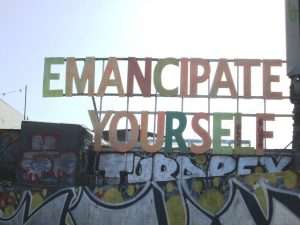Twenty years ago, protest might have been expressed through stickers on car windows declaring one’s support for a cause, or postcards sent by every member of a group asking politicians to reconsider their position; twenty years before that, people may have taken to the streets in their tens of thousands and marched to a park somewhere to hear speakers confirm what they already knew. Such efforts are no longer needed in the teen years of the Twenty-First Century. We do not need the trouble and expense of stickers or postcards, we certainly do not need to make the effort to actually go anywhere, instead we have social media.
Issues that might once have caused people angst sufficient to impel them to take action are now addressed in an altogether more passive fashion. Memes are shared on Facebook, hashtags on Twitter; posts are made on forums, comments on websites. It is all very liberating, we can be activists without stirring from the sofa; engage with the issues of the world while still watching Netflix or Skysports. It was never so easy to rally to a cause.
Of course, none of what we share or type does anything to change actual reality, even blogs are part of the antacid of political indigestion. Social media have replaced religion as the opiate of the people, deluding us into believing that our candle shared for Tibet, or our Tricolour Facebook profile, have significance.
The Italian writer Dario Fo has a description for the illusion that things are somehow changed, he calls it “a liberating burp.” It is the Fool in “Accidental Death of an Anarchist” who describes what happens. In a 1984 staging of the play, he declares:
. . . scandals are the fertilizer of Western democracy. Let me say more. Scandal is the antidote to an even worse poison: namely, people’s gaining political consciousness. If people become too conscious we are screwed. For example, has the American government, a real democracy, ever imposed any censorship to keep people from finding out about the murder of all the leaders of the black movement, or the massacre of thousands of helpless Vietnamese? Not at all. They don’t even hide the fact that they’ve manufactured enough nerve gas and bombs to destroy the population of the world ten times over. They don’t censor these scandals. And rightly so. Because in this way people have the possibility of becoming indignant. Horrified. ‘What kind of government is this? Disgusting generals. Assassins.’ And they become indignant. And out of the indignation comes a burp. A liberating burp. It’s like Alka-Seltzer. But nothing changes.
Social media give us daily opportunities to be indignant, to be horrified. Instantly, we can share our thoughts with countless “friends” and “followers.” We need have no concern for spelling, punctuation or grammar, for anyone who would criticize is simply an “elitist.” We need have no concern about inciting hatred, because we have an absolute right to free speech. We need have no concern for “facts,” because we believe the government hides the truth. We can vent our rage to the world.
And none of will make any difference. Burp.
